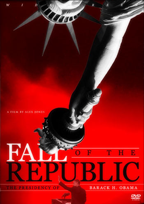(Reuters) - Three times a week, Mike Lackomar climbs into his truck and drives the same delivery route through the suburbs of Detroit.
Lackomar is an independent contractor for a private parcel company. If you live northwest of this battered city and you recently purchased something from a home shopping network, there's a good chance the 36-year-old handled your package.
But there is one small item that never leaves his truck: a green nylon satchel Lackomar jokingly calls "the football," a reference to the briefcase with codes for a nuclear strike kept close to the U.S. president. Inside, along with a pocket knife and a small first aid kit, is a sealed envelope containing codes, rallying points and detailed plans that Lackomar would use to mobilize his squad of armed citizen-soldiers in an emergency.
Lackomar is a team leader in the Southeast Michigan Volunteer Militia (SMVM), the largest and most visible of this state's many small private armies. He is a husband, a father and a musician. But his favorite picture on his Facebook page shows him standing in front of a snowmobile trailer packed with rifles, clips and ammunition boxes, a picture he laughingly admits looks "like an evidence photo from the 6 O'clock News."
The SMVM is one of 200 armed militias in the United States, a number that has quadrupled since 2008, according to the Anti-Defamation League, a civil rights watchdog, which says they may have 6,000 members and many other adherents.
MILITIAS: HARMLESS UNTIL THEY ARE NOT
The United States is one of the few Western democratic countries that permit independent militias.
Their rapid growth coincides with a sharp rise in partisan rhetoric as the November U.S. congressional elections draw nearer. Depending on your perspective, they are either patriots or paranoid. Experts in law enforcement and academia are divided as to how big an actual threat they may pose. But they all agree on one thing: the groups are very well armed.
"Most (militia groups) are merely in the rhetorical and defensive stage," said Brian Levin, professor of criminal justice at California State University and an expert on militias and domestic terrorism. "But we don't know which groups are going to be benign and which are going to be small incubators for radicalism."
His point was underscored by the arrest in late March of nine members of anti-government extremist group called the Hutaree, whose website says its name means "Christian Warrior." They were charged with planning a cop-killing spree intended to spark a broad insurrection.
And in February, a computer engineer angry with the government crashed a small aircraft into an office building in Austin, Texas, housing the federal Internal Revenue Service. In a rambling six-page statement, the man said he hoped his act would help make "American zombies wake up and revolt."
Until their arrest, the Hutaree were considered brothers-in-arms by other Michigan militia groups, including the SMVM. At least two of the men indicted by the government in the case briefly trained with Lackomar's group.
Before the group hatched its plot, the only rap against it in militia circles was that its training practices -- like run-and-gun target shooting -- were not the safest.
"I knew a couple of the guys that are sitting in jail right now. They were nice people," said Lackomar.
That is not to say he condoned the group's plan. One Hutaree member who evaded the police dragnet asked a member of Lackomar's group for help retrieving weapons and other supplies he had hidden at the group's safe house.
Instead, he got some unexpected advice: Turn yourself in. The suspect ignored the SMVM member, who went to the police.
Far from joining a rebellion, Lackomar's group and other militia members denounced the alleged plot and applauded the way the FBI and state police handled the raids.
"Nobody got hurt," Lackomar said. "There weren't any shots fired. They got everyone needed. They stopped the plan."
For that stance, Lackomar and other group members took some heat from what he calls "ultra-right ideologues" who consider the Hutaree victims of political persecution.
"TOYS"
Lackomar's group claims to have about 150 regular members and another 150 informal affiliates. At its annual field day and picnic recently, held not far from where the Hutaree are alleged to have hatched their plot, fewer than 100 people showed up.
All self-respecting militias pack what they call "toys" and the SMVM is no exception. Lackomar, who never served in the armed forces, favors an AK-74 assault rifle, an updated version of the iconic Soviet AK-47. Others in the group with army or marine experience prefer the AR-15, a copy of the M16 they used in their military days.
One member, a vice president of a financial services firm who prefers to be identified only by his radio call name, uses a Spanish version of the Heckler & Koch G3, a gun with a terrific report that Lackomar says "will rattle your fillings." Hence the man's call name: Thumper.
"When he's laying on the ground firing, the muzzle blast will dig trenches in front of him," Lackomar says with a hint of envy.
The lack of standardized weapons reflects both the ad hoc, volunteer nature of the SMVM and its egalitarianism.
There are no ranks, only positions like team leader and unit coordinator -- all decided by the group on a democratic basis. To become a voting member of the SMVM requires only two things, Lackomar says: possession of basic gear and a demonstrated competency with a weapon at 100 yards -- a hurdle that Lackomar says took him six months to clear.
Those two requirements aside, the SMVM insists it's open to anyone, regardless of race, color, religion or national origin. Lackomar nonetheless acknowledges the group's actual makeup is overwhelmingly white. "We're probably a little lopsided into the white end of the spectrum," he said.
THE MAD HATTER'S FOOTBALL
The SMVM trains once a month in a state park about 45 minutes outside of Detroit. The training, which includes a winter survival course, is designed to keep the unit in a state of readiness for an emergency.
For Lackomar, whose radio call name is "Mad Hatter," the emergency that triggers a militia response and tearing into "the football" might be a replay of a massive power outage in 2003 that paralyzed parts of the United States.
He ticks off other "tripwires" that might "drive our unit into action," including the imposition of martial law, a possibility many in the militia movement deem an imminent threat.
"The longtime discussion between militias has always been, 'What is the final straw?'" Lackomar said. "Freedom of speech has to be the final line. If we find ourselves in a situation ... where our freedom of assembly is suspended, demonstrations are outlawed or restricted, that's going to be the tripwire that sets everything off."
An assault on another militia group, like the Hutaree, could be a tripwire, too, Lackomar and others say. All it would have taken were for a few facts to be different.
"If what happened ... was a true crackdown on militias by a government run amok," he said, "not only would you have had the other units in Michigan say, 'Stop,' but it would have gone on all over the nation."
Lackomar provided two instances where he said the Michigan militia had activated -- at least on a small scale. Both involved standoffs between the police and a property owner who Lackomar said was being "crapped upon." The militia showed up, cradling but not pointing their weapons, as a show of solidarity with the property owner. In one case, Lackomar said the cops backed down. In another the property owner relented. No shots were fired or verbal threats exchanged.
Mike Vanderboegh, a militia veteran in Alabama who runs the influential blog called Sipsey Street Irregulars, adopts a more provocative tone in discussing what might trigger armed conflict.
"I can't see this (tension between federal authorities and the people) ending in any other way other than conflict," he said in an interview. "They (the government) truly believe that when they issue an order they think it will be obeyed. I don't see how that can end other than civil war."
PROTECTING THE CONSTITUTION
The militia movement has no single national leader and it contains wildly divergent strains of thought, according to militia members and experts. These include white supremacists and neo-Nazis; "Millenarians," who say major social transformation is imminent; and believers in "Christian Identity," a pro-white version of Christianity.
But the vast majority seem to be "constitutional" militias, fans of low taxes and small government -- values similar to those of many conservatives and the Tea Party movement.
They also see the possession of firearms as not only a right protected by the Second Amendment to the U.S. Constitution but a patriotic duty, a symbol of the citizen's equal standing with the government.
At the heart of the movement is a fierce allegiance to the U.S. Constitution and a belief that its rights and freedoms are threatened by the government.
One leading light is Robert Schulz, founder and chairman of We The People Foundation, a non-profit that organized two national gatherings last year. The meetings popularized a check list of alleged constitutional violations cited by elements of the conservative Tea Party movement and militias, according to "Midwifing the Militias", a report by the Southern Poverty Law Center, a non-profit which tracks hate groups.
Such violations included undeclared foreign wars, gifting and lending money and credit to private corporations, unconstitutional tax levying and unenforced immigration laws.
"What we have is government ignoring the Constitution," Schulz told Reuters in interview.
"TYRANNY OF THE MAJORITY"
Militia members like Lackomar, who is rare in his willingness to talk to the media, say that the movement is a healthy, democratic phenomenon with a real public benefit: providing an armed civilian alternative to the police and military. Although they don't quote Alexis de Tocqueville, the 19th century French observer of the United States, the militia members definitely see themselves as a deterrent to the "tyranny of the majority" that Tocqueville and others warned was a risk to the republic.
But the recent 15th anniversary of the Oklahoma City bombing served as a chilling reminder of the danger posed by so-called lone wolves: individuals fired-up by the movement's rhetoric -- and trained in militia warcraft -- who go on to stage attacks without the wider group's blessing.
Timothy McVeigh, the man convicted of the bombing, briefly associated with militia in Michigan in the 1990s before breaking away. When he resurfaced, in 1995, he murdered 168 people.
Private armies have a long history in America. In the 1850s, in the run-up to the American Civil War, anti-slavery and pro-slavery militias clashed in Kansas and Missouri, for example.
The modern militia movement was stirred into action in large part by George H.W. Bush's "New World Order" speech in 1990. The president's rhetoric fed into longstanding fears among far right groups like the John Birch Society about internationalism and the United Nations.
The resurgence then was also boosted by deadly sieges involving federal law enforcement officers in Ruby Ridge, Idaho and Waco, Texas -- events militia members viewed as examples of oppressive government force used against citizens.
Today, militia members and experts say a number of factors are driving the new surge:
* The 9/11 attacks, which revived the notion that citizens should defend the United States against threats.
* The 2001 Patriot Act, passed in the wake of 9/11, which stirred fears that the government would use enhanced powers against ordinary citizens.
* Anger at government failure to stop mass illegal immigration from Latin America.
* The recent recession, the worst since the 1930s.
* The election in 2008 of President Barack Obama. Many see Obama as a Socialist bent on growing government, raising taxes and confiscating guns; his status as the country's first African American president exacerbated fears about him, according to the Southern Poverty Law Center.
* Healthcare reform, seen as exemplifying oppressive government power and intrusion -- the contemporary version of a 1994 ban on assault weapons that enraged the right wing.
The extent to which healthcare reform is galvanizing the militia movement cannot be overstated. In more than a dozen conversations with militia members in recent weeks, the topic came up over and over again without prompting.
Even Lackomar, who has no insurance and admits "I'm one paycheck away from disaster -- and I have been for years," says: "I hate the reform." What infuriates him, he says, is that it was enacted despite widespread opposition.
The Anti-Defamation League, which monitors militia websites, said anti-government extremists were widely citing healthcare reform as a justification for violence.
"Many militia members and other extremists believe that the recently passed health care legislation will be followed by the mass legalization of illegal immigrants, postponement or elimination of democratic elections, martial law and gun confiscation," it said.
CONSPIRACY THEORIES
Allegations of infringed liberties are amplified in some sections of the media and online where false stories flagging government plans to build internment camps to detain U.S. citizens in the event of unrest or to install a New World Order can find a willing audience.
"The Internet has really facilitated a lot of communications between the militias," Lackomar said. "It's also given a voice to a lot of the wacko element. So you have got to take the good with the bad."
Most law enforcement agencies see the bulk of militia members as law abiding citizens exercising their rights to associate, bear arms and speak freely.
But one factor separates the mainstream "anti-government right" from those on the fringe, said Mark Pitcavage, ADL director of investigative research -- conspiracy theories.
"If your conspiracy theories are pretty limited and mild, like Obama is not really a citizen, or if they're generic, like Obama is a Socialist and he wants to turn this into a Socialist country, that's one thing," he said.
"But if you have specific conspiracy theories about the New World Order, the unholy trinity, FEMA (Federal Emergency Management Agency) concentration camps, martial law or door-to-door gun confiscation, then you have crossed the line," he said.
Some say the partisan polarization of the country's news media, typified by Rupert Murdoch's Fox News and MSNBC's Keith Olbermann, has also contributed to the militia's resurgence.
Robert Churchill, author of "To Shake Their Guns in the Tyrant's Face", a book about militias in U.S. politics, credits popular Fox News presenter Glenn Beck with bringing some ideas espoused by militias to a wider audience.
"You are beginning to get a spillover from far right discourse into main stream Republican discourse," he said.
SEND MONEY, GUNS AND TEA
In the early 1990s the militias were politically isolated. Today, they appear to be an armed point along a much bigger popular continuum that includes the Tea Party and the Oath Keepers, both gaining momentum fast.
Lackomar and other militia members, while certainly sympathetic to the Tea Party's goals, insist the two groups are unconnected -- even informally. "What we've tried to do is to make it so our group does not take political positions, except for constitutional versus unconstitutional, and the necessary focus on the Second Amendment," Lackomar said.
Still, in conversations with Reuters, SMVM members expressed admiration for the Tea Party's rapid growth in the past year and its ability to draw big crowds and mainstream politicians like Sarah Palin.
The online invitation to the SMVM's picnic this year encouraged guests to "show, shoot, shout then sip some tea with us." Lackomar says the reference was designed to appeal "to people who might be put off by the pure militia aspect."
The picnic culminated with a shooting competition. Among the promised targets: Copies of the U.S. tax form known as the 1040.
The Tea Party movement has sought to distance itself from the militia phenomenon, but the Oath Keeper movement seems closer to it in many ways while also sharing some common ground with the Tea Party.
Founded just a year ago by a Yale-educated lawyer and former paratrooper named Stewart Rhodes, it actively recruits serving and former military personal and law enforcement and asks them to pledge to defend the constitution -- even if it means disobeying orders. One of their slogans is "Not on Our Watch. At the top of its home page -- oathkeepers.org -- is a painting showing a rag-tag group of colonial militia men fighting British regulars.
On a recent warm, windy evening, a new central Texas branch of the Oath Keepers had its first official meeting at a community center annex in a residential housing complex at Fort Hood military base -- site of last November's mass shooting by a Muslim officer who killed 13 people.
Children rode bikes in the parking lot while Erik McKinster, a 39-year-old sergeant in the 1st Cavalry Division, introduced the Oath Keepers and their mission to four acting and former soldiers aged from their mid-20s to around 40.
"We don't care if an unlawful order comes from a Republican or a Democrat or is bipartisan," he said. "We don't need to follow orders from the president if they are unlawful, the oath is to the constitution."
The Oath Keepers are not a militia, but they share some Constitutional militia values and echo their call to action under certain circumstances.
Among orders they pledge to ignore are "any order to blockade American cities, thus turning them into giant concentration camps" and any order to "support the use of any foreign troops on U.S. soil against the American people."
The Anti-Defamation League sees them as prey to far right conspiracies. "They are not any orders that anyone (in government) would actually give," said Pitcavage. "They're only orders that you think someone might give if you believe in incredibly elaborate conspiracy theories."
McKinster, who was raised Catholic and is now an evangelical Christian and father of four, said he doesn't "believe for a second that there are currently secret plans to impose martial law ... but there are cases from the recent past where this has happened."
The central Texas group has over 30 members, he said, but none among law enforcement yet.
LONE WOLF
Few people have spent as much time tracking militia groups and domestic terrorism as James Cavanaugh, who spent 36 years as a lead investigator with the U.S. bureau of Alcohol, Tobacco, Firearms and Explosives.
Cavanaugh was a senior commander on investigations into the "Unabomber" case, the bombing by Eric Rudolph of the 1996 Atlanta Olympic Games, the 2002 Washington, D.C. sniper case and a rash of racially-motivated church fires in Alabama.
To cap it all, he led negotiations during the 1993 Waco siege at which around 80 people died. He talked by telephone with Branch Davidian leader David Koresh throughout the group's gun battle with federal agents in an attempt to secure the release and rescue of wounded agents and children.
He is concerned that even if most militia members are law-abiding, web-fueled paranoia and wild theories can tip an individual or a splinter group toward criminality.
"They (militias) all sit around the campfires, rattling sabers and looking into the woods believing that somebody's coming. To make sure they come, they plan an attack," he said.
"The reason they are dangerous is they live on the edge of the abyss," he said. "Sure, there are groups who dress in camouflage, stockpile guns legally, talk incessantly about crackpot conspiracy theories, that don't fall into the abyss.
"The problem is there is always ... (someone) who attaches themselves, and if the group doesn't go over the rails the individual does," he said.
While security authorities say the majority of militia groups operate within the law, law enforcement is watching. Quietly.
Lackomar says that on the eve of the 2008 presidential election, four SMVM leaders were simultaneously visited by the FBI agents, who wanted to know if the group had heard any chatter about possible violence if Obama was elected.
And the swiftness with which the Hutaree were infiltrated and brought down shows the Feds are not asleep at the wheel.
That is in part because digital tools work both ways, allowing authorities to infiltrate the groups more easily.
IT'S A FAMILY AFFAIR
Back at the Michigan picnic near Detroit, Lee Miracle would do anything for a taste of baklava.
To the extent that the SMVM has a leader, it is Miracle, a 43-year-old, pony-tailed postal worker who has been a member of the movement for two decades.
For Miracle, as for a handful of other SMVM members, the militia is a family affair and all eight of his children, who are aged 6 to 18, have either trained with it or received weapons instruction. At the picnic in early April, Miracle's wife Katrina, a gracious Greek-American, came too, bearing not a weapon, but an enormous tray of baklava.
One of the group's more ominous looking pamphlets features Lee Miracle on the cover, standing on the front steps of a house, decked out in camouflage battle gear with a machine pistol resting on his hip. In the bottom left, a small child looks up at the armed, defiant figure in awe. "Defending your home is homeland defense," it reads.
In person, Miracle turns out to be a self-deprecating man with a fondness for jokes. What he seemed most frustrated about at the picnic was Katrina's refusal to give him any baklava.
"He has diabetes," she explained to a reporter.
Lackomar is also a family man. His sun visor has a kid's playing card attached depicting Loudred, a Rumplestiltskin-like Pokemon character, who spends much of his time stamping his feet on the ground and shouting. "My daughter says it fits me because I'm always yelling at other drivers," Lackomar said with a chuckle.
Yet he turns serious as he imagines scenarios under which the militia might mobilize, such as the day "it comes crashing down and the world ends" or the day "the communist Chinese or the Venezuelans or whoever come marching across the border."
His unit has been busy learning survival skills, such as making a bow from a sapling or fashioning a rock into a razor sharp knife.
"I carry, as part of my battle gear, a rifle and 290 rounds of ammo," Lackomar said. "If I can use a knife, and fashion a bow, and use that to feed my family, I can save the ammo for dropping bad guys."
Source











